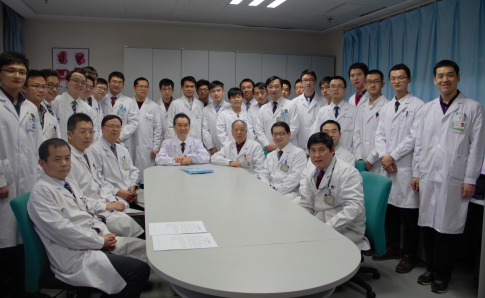----Hepatopancreatobiliary Surgery
A. Introduction of the Team
 Academic Leader: Prof. Dr. CHEN Xiaoping, academician of Chinese Academy of Science, chairman of Department of Surgery, Director of the Institute of Hepato-pancreato-biliary Surgery and Hepatic Surgery Center of Tongji Hospital.
Academic Leader: Prof. Dr. CHEN Xiaoping, academician of Chinese Academy of Science, chairman of Department of Surgery, Director of the Institute of Hepato-pancreato-biliary Surgery and Hepatic Surgery Center of Tongji Hospital.
Prof. CHEN obtained his M.D. in 1985 and then got further trained in Germany and United States, dedicated to hepatopancreatobiliary surgery for 40+ years, and established a number of innovative techniques for HPB surgery and did significant contribution to academic society, especially A-PHPBA. He received the International Scholar title from the American Cleveland Medical Communication Center, earned American Sackler Chinese Doctor Annual Award in 1996, received WU Meng-chao Hepatobiliary Surgery Foundation Award in 1997. In 2002, his studies on“Series of Research & Technique Amelioration in Hepatic Surgery”made him the first winner of the Chinese Medical Association Award. He was elected Director of the Hepatic Surgery Group of Chinese Medical Association in 2002, and president of the Chinese Chapter of the International Hepato-pancreato-biliary Association in 2003. His “The Research on Basic & Clinical Application in Hepatic Surgical Operation” won the National Science and Technology Progress Award in 2004.
Prof. Dr. Chen has been performing clinical practice focusing on HBP surgery characterized by a broad spectrum of malignant carcinoma associated with liver, bile duct and pancreas. He also dedicates himself to clinical liver transplantation. In addition to clinical practice and administrative obligations, Prof. Dr. Chen is an unrelenting researcher and pioneer in the field of cancer biology and clinical trials. He has published 500+ peer-reviewed articles and won funding from the NSFC (Natural Science Foundation of China) for decades. He possesses the title of editor-in-chief and honorable reviewer of more than 30 domestic and international journals.
Main Team Members
Prof. Dr. ZHANG Bixiang, post-doctor in Vanderbilt University in U.S.A. in 2006-2009, specialist in molecular mechanism research and targeting intervention treatment on tumor organ-specific metastasis, expert surgeon in performing highly difficult HPB surgeries like hepatectomy, hilar cholangiocarcinoma, pancreaticoduodenectomy, cholelithiasis and liver transplantation. He has sponsored 4 General Programs of NSFC (Natural Science Foundation of China) and participated in many key programs of NSFC, MOHC (Ministry of Health of the People's Republic of China) and so on, with publication of 60+ SCI papers.
Prof. ZHANG Zhiwei, specialist in liver regeneration, did basic and clinical research on liver transplantation and hepatogenesis in Hong Kong University in 1999-2000. He participated in one “973 Program”, one national “10th Five-Year Plan” project, 2 NSFC projects, 4 Provincial and Ministry Projects, and published 70+ papers.
Prof. HUANG Zhiyong, deputy director of the Discipline Construction Office and the General Surgical Research Laboratory of Tongji Hospital, member of the Education and Training Committee of the International Hepato-Pancreato-Biliary Association (IHPBA) (2014-2018), standing committee member of the Asian-Pacific Hepato Pancreatic Biliary Association (APHPBA) (2015-2017), member of the APHPBA Research Committee (2011-2015) and the Secretary General of the IHPBA China Chapter (2004-).
Prof. CHEN Yifa, doctoral student of Prof. QIU Fazu, engaged in clinical surgical treatment for 20+ years, rich clinical experience in all kinds of hpb and splenic diseases, especially the diagnosis and surgical treatment of different benign and malignant liver and gallbladder tumors, portal hypertension and malignant obstructive jaundice. Prof. Chen has compiled or participated in writing 10 surgery medical monographs in the field.

B. Main Research Areas:
hepatopancreatobiliary surgery: treatment and resection of hepatocellular carcinoma ; hemostasis in liver surgery; assisted partial liver transplantation; small-range hepatectomy in hilar cholangiocarcinoma; invaginated pancreaticojejunos tomy. Research on the molecular mechanism of recurrence and metastasis of liver cancer.
C. Background & Significance
1. Research Background
Pancreatohepatobiliary diseases impose serious hazards to people's health. Among them, liver cancer is one of the most common malignant tumors in China, 50% of the world's liver cancer patients are in mainland China, which top the world in new morbidity and mortality. At present, the incidence of hepatocellular carcinoma in China is about 25.7/100,000, which is the third largest malignancy after gastric and lung cancer. Though combined treatment with surgical resection is recognized to be the best treatment, how to reduce surgical bleeding, complications and mortality, and improve long-term survival is a key challenge in this field. At the same time, liver transplantation is the most effective way to treat various liver metabolism malfunction, fulminant hepatic failure and advanced schistosomiasis patients. However, due to the shortage of donors, how to improve the long-term survival of graft needs to be studied with comprehensive perspectives concerning anatomy, hemodynamics, oncology, pathology and operative surgery etc.
Primary hepatocellular carcinomas has rather poor prognosis due to recurrence and metastasis after surgical resection, which needs further studies to provide theoretical basis for locating accurate tumor markers and developing new target therapy drugs. Progress of treatment and concepts innovation are constantly needed to improve the prognosis.
2. Academic Strength
Liver Surgery Department of Tongji Hospital of HUST, one of the largest diagnosis and treatment center for liver cancer whose comprehensive strength tops the world, enjoys high domestic and international reputation. There are 218 beds in the center which admits 4,000+ inward patients and performs 2,000+ surgical operations annually. Liver minimally invasive treatment wards and postoperative wards are established earliest in China. A multidisciplinary diagnosis and treatment team of liver cancer, including surgery, oncology, ultrasound, imaging, gastroenterology, infection and pathology has been established and perfected. The Department has 3-dimension liver reconstruction system, indocyanine green liver reserve function analysis system, Da Vinci surgical robot, high-definition 3D laparoscopy, bipolar electric coagulation forceps, ultrasonic scalpel, CUSA, intraoperative ultrasound, navigation equipment etc. Professional perioperative data collection, biological sample collection and postoperative follow-up team were established. It has also formed laboratory engaged in basic research on liver invasion and metastasis of malignant tumor, equipped with cell culture apparatus, high-speed centrifuge at low temperature, fluorescence quantitative PCR, gel imaging system, laser confocal microscopy, immune enzyme-linked analysis, double fluorescent reporter gene detection system etc.
D. Achievement & Awards
1. The earliest liver resection to treat hepatoma in China (in 1958) and the earliest clinical trial in liver transplantation (in 1980), awarded the First Prize of Science and Technology Progress by Ministry of Health;
2. Earliest advocate of the feasibility to treat large-size hepatoma by hepatectomy and established a series of innovative surgical techniques, awarded the Second Prize of National Science and Technology Progress;
3. The coordinator for CMA(China Medical Association) to formulate the Options for Surgery to Treat primary Hepatoma and the Diagram of Diagnosis and Treatment for Hepatocellular carcinoma;
4. Coordinator to formulate the Operating Regulation in Minimally Invasive Treatment of Hepatocellular Carcinoma in China;
5. Initiator and promoter of laparoscopy to perform hepatectomy in China and Asian-Pacific Region;
6. The number and difficulty of liver resection by robot top the world leading level;
7. The initiator of in situ assisted partial liver transplantation model and apply it to clinical practice in the world;
8. First performer of small-range hepatectomy and biliary-enteric anastomosis surgery to treat hilar cholangiocarcinoma;
9. First performer of the surgery described as invaginated pancreaticojejunos tomy with transpancreatic U-sutures;
10. A series of research findings in the molecular mechanism of recurrence and metastasis of liver cancer.
Team Contact: Dr. LI Lu, 369632933@qq.com
